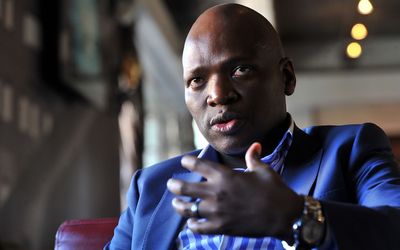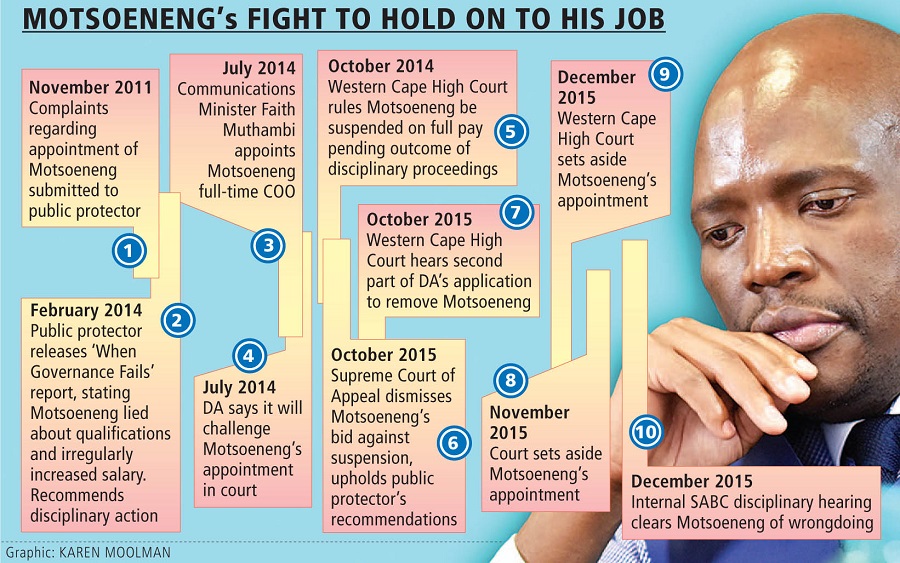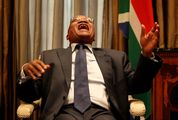THERE is still no clarity on the future of South African Broadcasting Corporation (SABC) chief operation officer Hlaudi Motsoeneng, just one of several unresolved issues at the public broadcaster.
It is looking likely that the Constitutional Court is where Mr Motsoeneng’s fate will be decided once and for all. The controversial boss has been fighting tooth and nail to hold on to his job, and despite a number of court judgments against him, he remains in his post.
A judgment by the high court in Cape Town last month set aside Mr Motsoeneng’s appointment, describing it as "irrational and unlawful". Communications Minister Faith Muthambi, the SABC and Mr Motsoeneng are appealing against this ruling, and this he has used to remain in his position, pending the finalisation of court processes.
An internal SABC disciplinary hearing cleared Mr Motsoeneng of wrongdoing last weekend. The SABC has confirmed that Mr Motsoeneng has returned to work to "contribute meaningfully to the success of the public broadcaster", pending the finalisation of the court appeal process.
While all this has been happening, the SABC board has six vacancies, a situation that threatens to further destabilise the broadcaster. Ms Muthambi has also tabled the controversial Broadcasting Amendment Bill which, among other things, will remove Parliament’s role in the selection of nonexecutive board members if passed.
Constitutional law expert Pierre de Vos says when one appeals against a judgment, the order is suspended, so technically, the SABC is not defying a court order. But "in spirit, it is defying the order as the high court found that Motsoeneng was not validly appointed and the indecent haste of the SABC in bringing him back … suggests it does not respect the high court judgment, especially as the high court has not even granted leave to appeal yet".
Mr Motsoeneng’s court battles stem from a damning public protector report, released in February last year, that found he had misrepresented his qualifications, irregularly increased his salary and purged senior staff who disagreed with him.
The public protector recommended he be suspended pending a disciplinary hearing. The SABC ignored this initially. Ms Muthambi went on to confirm Mr Motsoeneng as SABC chief operating officer.
This prompted the Democratic Alliance (DA) to launch a two-part court challenge: first, to force the SABC to adhere to the public protector’s recommendations; and, second, to set aside his permanent appointment in light of the public protector’s report.
The DA was successful in both cases.
The SABC has technically adhered to the public protector’s recommendation that Mr Motsoeneng be "disciplined".
But, some say the outcome of Mr Motsoeneng’s disciplinary hearing was predictable since the broadcaster initially challenged the order that he be disciplined and has been backing him with gusto.
Prof de Vos says the disciplinary hearing was not independent as it was chaired by someone paid by the SABC.
"It came to the opposite conclusion that two independent bodies — the public protector and the high court — (came to). Given that the public protector actually quoted Mr Motsoeneng admitting that he dishonestly "made up" matric marks for courses he had failed, it is unclear on what basis he was exonerated," Prof de Vos said.
He says: "In any event, as this is not an independent inquiry, it will have absolutely no effect on the appeal.
"The Supreme Court of Appeal, if leave to appeal is indeed granted, will make a finding on the proven facts, not on other considerations."
The SABC proceeded with the disciplinary process even after then chairman William Mokhari called it off, citing the judgment that set aside Mr Motsoeneng’s appointment.
"The high court ruling means that Mr Motsoeneng is no longer an employee of the SABC … so why proceed to discipline someone who is no longer an employee? If the appeal is successful and he returns to the SABC, the hearing can go ahead," Mr Mokhari said earlier this month.
Insiders say the SABC is likely to use the outcome of the hearing in its appeal against the court’s invalidattion of Mr Motsoeneng’s appointment.
"That’s why they moved quickly to replace Mr Mokhari after he called off the hearing … they need to use the outcome of the disciplinary hearing to back their case to retain Hlaudi," says an SABC insider, who asks to remain anonymous.
The DA, which has been leading the campaign to remove Mr Motsoeneng from his post, has said the disciplinary hearing is a "whitewash" and that the party will "almost certainly take it under review".
In a terse response to the DA’s plan to review the disciplinary hearing, Mr Motsoeneng’s lawyer, Zola Majavu, says "they can go ahead".
Media Monitoring Africa director William Bird says the SABC’s problems stem from poor corporate governance, ministerial interference and an absence of accountability.
"The problems are not new … they merely take different forms depending on the personality," he says.
Last month the SABC gave no reasons for suspending its CEO, Frans Matlala, barely five months after he had taken charge. Jimi Matthews, the broadcaster’s group executive for news and current affairs, was appointed acting CEO.
According to Mr Bird, "If we are serious about building our democracy, it is critical that we get the basics right.
"Sadly, the latest effort to undermine the broadcaster and our democracy with the Broadcast Amendment Bill will see 2016 start with an emphasis on protecting the basic principles in our Constitution instead of building on it."

CLEARED: Hlaudi Motsoeneng at the disciplinary hearing in Sandton last weekend, where he was cleared of all charges. Picture: GALLO IMAGES/ELIZABETH SEJAK
THERE is still no clarity on the future of South African Broadcasting Corporation (SABC) chief operation officer Hlaudi Motsoeneng, just one of several unresolved issues at the public broadcaster.
It is looking likely that the Constitutional Court is where Mr Motsoeneng’s fate will be decided once and for all. The controversial boss has been fighting tooth and nail to hold on to his job, and despite a number of court judgments against him, he remains in his post.
A judgment by the high court in Cape Town last month set aside Mr Motsoeneng’s appointment, describing it as "irrational and unlawful". Communications Minister Faith Muthambi, the SABC and Mr Motsoeneng are appealing against this ruling, and this he has used to remain in his position, pending the finalisation of court processes.
An internal SABC disciplinary hearing cleared Mr Motsoeneng of wrongdoing last weekend. The SABC has confirmed that Mr Motsoeneng has returned to work to "contribute meaningfully to the success of the public broadcaster", pending the finalisation of the court appeal process.
While all this has been happening, the SABC board has six vacancies, a situation that threatens to further destabilise the broadcaster. Ms Muthambi has also tabled the controversial Broadcasting Amendment Bill which, among other things, will remove Parliament’s role in the selection of nonexecutive board members if passed.
Constitutional law expert Pierre de Vos says when one appeals against a judgment, the order is suspended, so technically, the SABC is not defying a court order. But "in spirit, it is defying the order as the high court found that Motsoeneng was not validly appointed and the indecent haste of the SABC in bringing him back … suggests it does not respect the high court judgment, especially as the high court has not even granted leave to appeal yet".
Mr Motsoeneng’s court battles stem from a damning public protector report, released in February last year, that found he had misrepresented his qualifications, irregularly increased his salary and purged senior staff who disagreed with him.
The public protector recommended he be suspended pending a disciplinary hearing. The SABC ignored this initially. Ms Muthambi went on to confirm Mr Motsoeneng as SABC chief operating officer.
This prompted the Democratic Alliance (DA) to launch a two-part court challenge: first, to force the SABC to adhere to the public protector’s recommendations; and, second, to set aside his permanent appointment in light of the public protector’s report.
The DA was successful in both cases.
The SABC has technically adhered to the public protector’s recommendation that Mr Motsoeneng be "disciplined".
But, some say the outcome of Mr Motsoeneng’s disciplinary hearing was predictable since the broadcaster initially challenged the order that he be disciplined and has been backing him with gusto.
Prof de Vos says the disciplinary hearing was not independent as it was chaired by someone paid by the SABC.
"It came to the opposite conclusion that two independent bodies — the public protector and the high court — (came to). Given that the public protector actually quoted Mr Motsoeneng admitting that he dishonestly "made up" matric marks for courses he had failed, it is unclear on what basis he was exonerated," Prof de Vos said.
He says: "In any event, as this is not an independent inquiry, it will have absolutely no effect on the appeal.
"The Supreme Court of Appeal, if leave to appeal is indeed granted, will make a finding on the proven facts, not on other considerations."
The SABC proceeded with the disciplinary process even after then chairman William Mokhari called it off, citing the judgment that set aside Mr Motsoeneng’s appointment.
"The high court ruling means that Mr Motsoeneng is no longer an employee of the SABC … so why proceed to discipline someone who is no longer an employee? If the appeal is successful and he returns to the SABC, the hearing can go ahead," Mr Mokhari said earlier this month.
Insiders say the SABC is likely to use the outcome of the hearing in its appeal against the court’s invalidattion of Mr Motsoeneng’s appointment.
"That’s why they moved quickly to replace Mr Mokhari after he called off the hearing … they need to use the outcome of the disciplinary hearing to back their case to retain Hlaudi," says an SABC insider, who asks to remain anonymous.
The DA, which has been leading the campaign to remove Mr Motsoeneng from his post, has said the disciplinary hearing is a "whitewash" and that the party will "almost certainly take it under review".
In a terse response to the DA’s plan to review the disciplinary hearing, Mr Motsoeneng’s lawyer, Zola Majavu, says "they can go ahead".
Media Monitoring Africa director William Bird says the SABC’s problems stem from poor corporate governance, ministerial interference and an absence of accountability.
"The problems are not new … they merely take different forms depending on the personality," he says.
Last month the SABC gave no reasons for suspending its CEO, Frans Matlala, barely five months after he had taken charge. Jimi Matthews, the broadcaster’s group executive for news and current affairs, was appointed acting CEO.
According to Mr Bird, "If we are serious about building our democracy, it is critical that we get the basics right.
"Sadly, the latest effort to undermine the broadcaster and our democracy with the Broadcast Amendment Bill will see 2016 start with an emphasis on protecting the basic principles in our Constitution instead of building on it."






















Change: -1.46%
Change: -1.66%
Change: -1.76%
Change: -1.63%
Change: -1.41%
Data supplied by Profile Data
Change: -0.48%
Change: 0.12%
Change: -1.46%
Change: 0.00%
Change: 0.10%
Data supplied by Profile Data
Change: 0.58%
Change: -0.27%
Change: 0.49%
Change: 0.81%
Change: 1.16%
Data supplied by Profile Data
Change: 0.70%
Change: 0.41%
Change: 0.25%
Change: 0.17%
Change: -0.15%
Data supplied by Profile Data